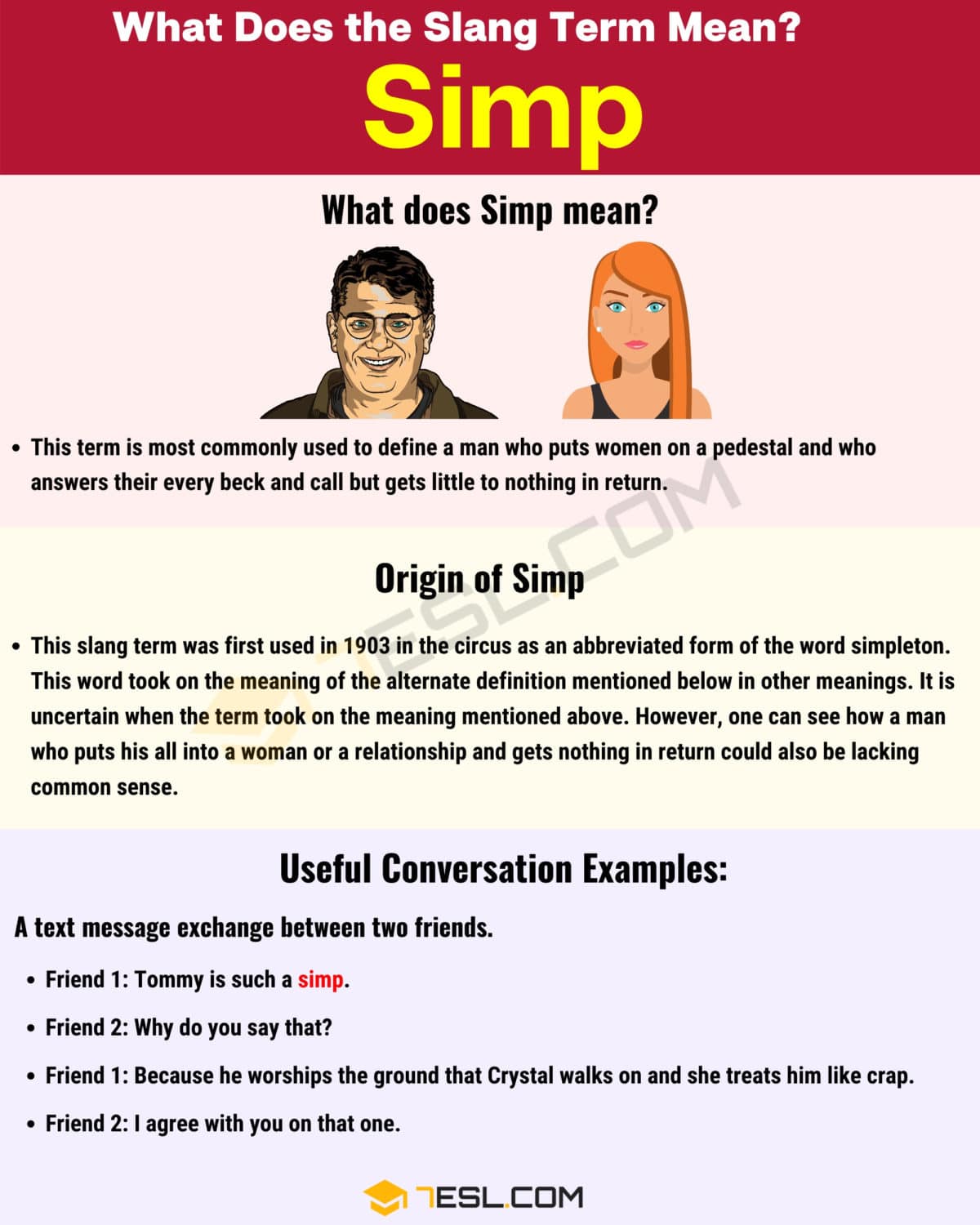What Does "Simp" Mean? Definition & Usage Explained
Is "simp" just a harmless internet meme, or does it reflect something more complex about modern relationships? The term "simp" has rapidly evolved from a slang insult to a cultural marker, influencing how we perceive and navigate interactions, particularly online.
The word "simp," as a contraction of "simpleton," has existed for quite some time, originally used to describe someone foolish or silly. However, its current iteration emerged, gaining traction in the realms of rap music and social media around 2019. Now, it predominantly functions as a pejorative, mainly directed towards men who are perceived as being overly attentive, submissive, or desperate for the affection of a woman.
| Term | Description | Context | Origin | Common Usage |
|---|---|---|---|---|
| Simp | A person (typically male) who is excessively attentive and submissive to another (typically female), often in an attempt to gain romantic or sexual attention. | Social media, online gaming, casual conversation. | Evolved from "simpleton," popularized in rap music and online communities. | Derogatory, used to criticize perceived weakness or desperation. |
| Simping | The act of behaving like a simp; going to excessive lengths to please someone else. | Online interactions, real-life relationships. | Verb form of "simp." | Descriptive of actions perceived as overly eager or fawning. |
| "Doing too much" | Actions taken to impress or please another person that are seen as excessive or unnecessary. | Dating, relationships, social interactions. | Synonymous with simping. | Criticizing behaviors perceived as desperate or inauthentic. |
Source: Urban Dictionary
- Deon Taylors Net Worth 2024 How Much Is He Worth
- Lesli Margherita Daniel Stafford Facts Marriage More Explained
The prevalence of "simp" and "simping" reveals a shift in the way we analyze relationship dynamics, especially within digital spaces. The term is frequently employed to chastise individuals who are seen as being excessively invested in a potential romantic interest, particularly when their efforts are unreciprocated. This can manifest in various ways, from showering someone with compliments and gifts to altering one's own behavior to appease another person.
While the term's usage varies, it often carries negative connotations. Some see it as a way to shame those perceived as "weak" or "desperate," while others utilize it in jest. However, a significant portion of users, as studies have revealed, perceives being called a "simp" as an insult, highlighting the potential for the word to cause embarrassment or hurt feelings.
The evolution of the word "simp" also tells us something about changing gender dynamics. The term is predominantly applied to men, and, in certain contexts, it reinforces traditional expectations of male behavior. The expectation for men to be assertive and dominant, and that any deviation from this is viewed with scorn.
- Flight Risk A Thrilling Ride You Wont Want To Miss
- Breaking Fernando Amaya Charged In Fatal Shooting At 7500 Cook Road
It's important to note that the term "simp" doesn't have a single, definitive meaning. Its interpretation is often dependent on context, the relationship between the speakers, and the specific actions being criticized. For some, it's a lighthearted way to call out excessive behavior, while for others, it's a more critical assessment of someone's character.
The simplicity of "simp" can be deceptive. Behind the slang term lies a complex interplay of societal expectations, personal insecurities, and the ever-present pressures of the digital age. It touches on themes of desire, rejection, and the ongoing struggle to establish healthy relationships in a rapidly changing world.
The term's application can vary even within the same social circles. One person's "simp" might be another's romantic gesture. This ambiguity is a key aspect of its cultural relevance. It highlights how perceptions of appropriate and acceptable behavior are constantly evolving, shaped by the influence of media, online trends, and personal experiences.
The rise of the "simp" also mirrors a larger cultural shift in how we discuss gender roles and expectations. The term often intersects with conversations about consent, healthy relationships, and the power dynamics inherent in social interactions. The critique inherent in the term can be a reflection of the changing ways that people view these elements.
The debate surrounding "simp" highlights the ongoing conversation about relationships in the age of social media. The rise of online dating platforms, and the increasing visibility of relationships online, has changed the way we form relationships. It also affects how we perceive and react to these interactions.
It's crucial to understand the cultural context when interpreting the word "simp." Without that, there's the risk of misunderstandings or unfairly labeling someone. The rise of such words shows the evolving language that attempts to describe modern social interactions.
The rise of the "simp" phenomenon can also be seen as a reflection of the broader cultural anxiety surrounding dating and romantic relationships. The fear of rejection, the pressure to present oneself in a particular way, and the influence of online personas all contribute to this evolving terminology.
There is also the argument that the term reinforces harmful stereotypes. Some view it as a type of "benevolent sexism" that perpetuates the idea that men should always be seeking the approval of women and that any deviation from this is "weak." These subtleties make the "simp" debate a complicated and multifaceted conversation.
The evolution of the word reflects how our understanding of relationships is in flux. It serves as a window into broader cultural dynamics, revealing a complex tapestry of expectations, anxieties, and ever-shifting social norms. To truly grasp the meaning of "simp," it's essential to consider its context, understand the societal pressures that shape behavior, and appreciate the nuances of interpersonal relationships.
The term also reflects the influence of internet subcultures. From its roots in rap music and internet memes to its widespread use on social media platforms like TikTok and Instagram, the term's evolution is deeply intertwined with online communities. It shows the speed at which trends and words can be created, shared, and evolve in the digital world.
The "simp" is not simply a word; it is a cultural phenomenon, a reflection of the times we live in. It mirrors the shifting landscape of relationships, the increasing influence of online interactions, and the continuing need to understand the complexities of human connection. Whether viewed as an insult, a joke, or a commentary on modern dating, the term remains a powerful reminder of the ever-evolving dynamics of our social world.
The term can also be seen as a form of social commentary, a critical assessment of behavior that is perceived as excessive or inauthentic. The word is a tool, used to challenge perceived imbalances in power dynamics, and encourage a reevaluation of the ways we interact with others.
The rise of the word "simp" is also a reflection of broader cultural shifts in how we communicate and express ourselves. From text messaging and social media to online forums, the word shows how slang and jargon continue to shape our language. The ever-changing vocabulary shows how we're always looking for new ways to express ourselves and describe the world around us.
The evolution of the term highlights the complex relationship between language and culture. The way we use words reflects our values, beliefs, and social practices. And as our culture changes, so too does our language, creating new ways to describe the world and the people in it.
Whether you see "simp" as a harmless bit of slang, a tool of social commentary, or a symptom of broader societal anxieties, one thing is clear: the term has become a permanent part of our cultural vocabulary. It speaks volumes about our evolving relationship with language, technology, and each other.
It is crucial to consider the full context, the user, and the broader cultural landscape. Without a solid understanding of these aspects, there's a risk of unfairly labeling someone or misinterpreting their intentions. It's about understanding where the word comes from, what it means to those who use it, and how it reflects the world around us.
The term "simp" has become a fixture in our contemporary language. It serves as a constant reminder of the many, complex, and often contradictory elements of relationships in the digital age. Its presence and meaning will likely continue to evolve as society's understanding of relationships continues to change.



Detail Author:
- Name : Luna Schimmel
- Username : jennyfer.goyette
- Email : carey53@prohaska.com
- Birthdate : 1984-07-10
- Address : 96761 King Cliffs Jesseburgh, VA 00168-6904
- Phone : +1 (385) 761-7942
- Company : Gerlach-Nader
- Job : Excavating Machine Operator
- Bio : Praesentium consectetur occaecati sapiente ab tempora tempore. Qui omnis in porro quia non explicabo autem.
Socials
facebook:
- url : https://facebook.com/jaqueline_id
- username : jaqueline_id
- bio : Neque itaque nihil officia est minus ea quam.
- followers : 1043
- following : 2606
twitter:
- url : https://twitter.com/jaqueline.bradtke
- username : jaqueline.bradtke
- bio : Repudiandae modi eum totam consequuntur quos est dolor. Assumenda occaecati debitis culpa dolores. Blanditiis vero hic similique ipsam et voluptates.
- followers : 6140
- following : 2543
linkedin:
- url : https://linkedin.com/in/jbradtke
- username : jbradtke
- bio : Reiciendis saepe sit quo aliquid veniam.
- followers : 1006
- following : 317
instagram:
- url : https://instagram.com/jaqueline.bradtke
- username : jaqueline.bradtke
- bio : Et vel ab magni cum voluptas. Hic omnis officia eaque autem. Quis commodi voluptas explicabo quia.
- followers : 4948
- following : 1698